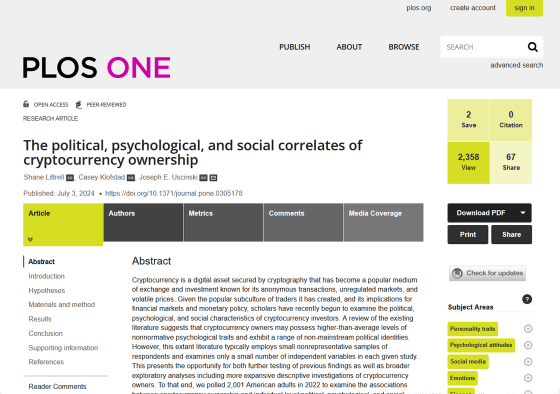People who invest in cryptocurrencies are more likely to have ‘dark personality traits’

 Virtual currencies such as Bitcoin and Ethereum record transaction history in an electronic ledger using cryptographic technology called blockchain , enabling anonymous transactions without government regulation. In recent years, the number of people investing in virtual currencies has increased, but a new survey conducted by a research team from the University of Toronto and the University of Miami revealed that people who invest in virtual currencies are more likely to have ‘dark personality traits,’ engage in conspiracy theories, and use non-mainstream social media.
Virtual currencies such as Bitcoin and Ethereum record transaction history in an electronic ledger using cryptographic technology called blockchain , enabling anonymous transactions without government regulation. In recent years, the number of people investing in virtual currencies has increased, but a new survey conducted by a research team from the University of Toronto and the University of Miami revealed that people who invest in virtual currencies are more likely to have ‘dark personality traits,’ engage in conspiracy theories, and use non-mainstream social media.
The political, psychological, and social correlates of cryptocurrency ownership | PLOS ONE
https://journals.plos.org/plosone/article?id=10.1371/journal.pone.0305178

Cryptocurrency investors linked to dark personality traits – Earth.com
https://www.earth.com/news/cryptocurrency-investors-linked-to-dark-personality-traits/
Dark Personality Traits of People Who Invest in Crypto Revealed : ScienceAlert
https://www.sciencealert.com/dark-personality-traits-of-people-who-invest-in-crypto-revealed
The concept of privacy-protecting digital currency emerged in the 1980s, but virtual currencies became widespread with the emergence of Bitcoin in 2009. The total assets in the virtual currency market are estimated at $2.5 trillion (approximately 380 trillion yen) at the time of writing, with most of that being held in the form of major virtual currencies such as Bitcoin, Ethereum, and Tether.
Cryptocurrencies, which allow anonymous transactions through the blockchain, are said to provide privacy and security protections that are not possible with other forms of government-issued currency, and to enable an economy that is not subject to state regulation. However, many people who invest in cryptocurrencies are ignoring these privacy aspects, and see cryptocurrencies as a medium for making profits by taking advantage of market fluctuations, rather than as a currency that can be used to purchase goods and services. In that respect, science media Science Alert points out that cryptocurrencies are closer to gambling chips than to cash.
Science Alert states, ‘Motivated by a distrust of mainstream authority, one might expect cryptocurrency investors to place a strong emphasis on conspiracy theories, hold alternative political leanings, and have less trust in science. However, existing research makes it difficult to pigeonhole investors to any particular ideology, and we find that cryptocurrency owners are a diverse group, including anarchists, libertarians, and populists. Other research has pointed to links between far-right beliefs and white supremacy .’
As such, there are many different opinions about what kind of people are in favor of virtual currencies. Therefore, the research team conducted a survey of 2,001 adults living in the United States, asking them about their political, psychological, and social characteristics in addition to whether they own virtual currencies.
Analysis of the responses revealed that about 30% of respondents owned cryptocurrencies. The political leanings of cryptocurrency holders were surprisingly broad, ranging from left to right, but they also tended to stray from traditional political leanings and adhere to Christian nationalism and
They also showed typical dark personality traits, such as narcissism , Machiavellianism , psychopathy , and sadism , and scored slightly higher on a scale reflecting a need for ‘chaos’ compared to non-cryptocurrency investors.
According to the research team, the strongest predictor of the likelihood of owning cryptocurrency was relying on non-mainstream media such as social media for news. Other characteristics associated with cryptocurrency ownership included being male, liking to argue, disliking authoritarian governments, having a high income, and feeling like a victim.
Because the findings in this study are based solely on self-reporting and the number of people surveyed is small, it’s unclear whether the findings can be generalized to the rest of the public or to people outside the United States.
‘As governments seek to regulate cryptocurrencies more strictly and, in some cases, issue national cryptocurrencies, it will be necessary to understand the appeal of cryptocurrencies,’ the team said.
